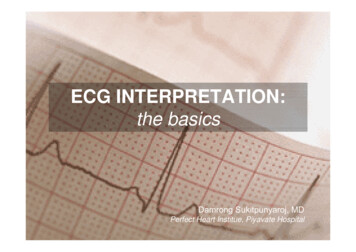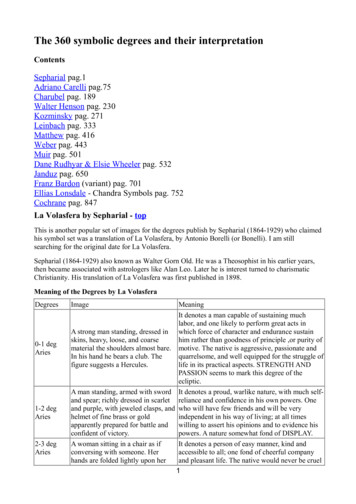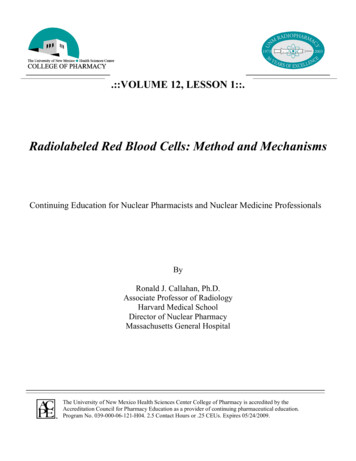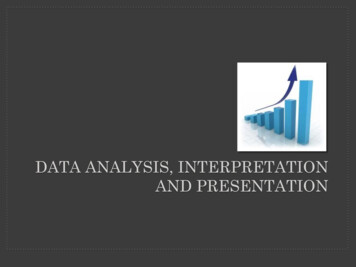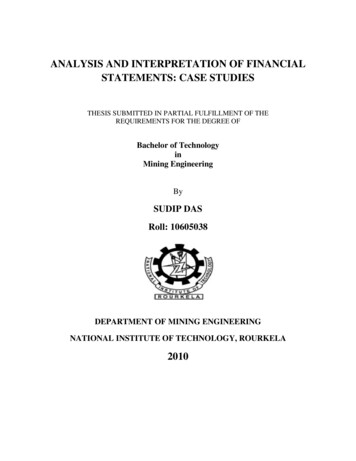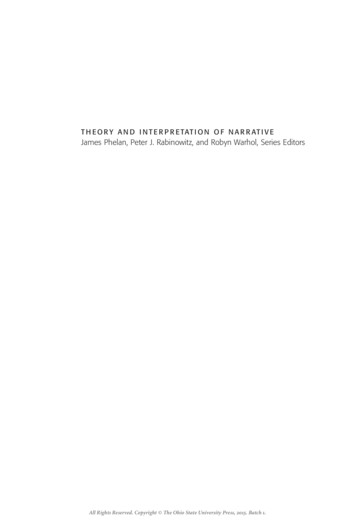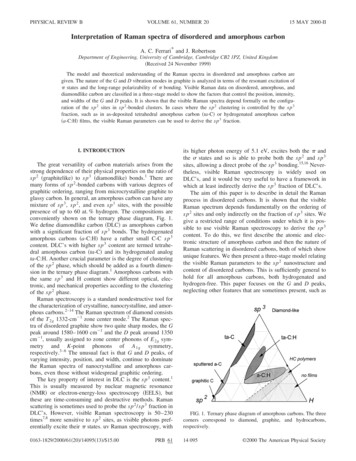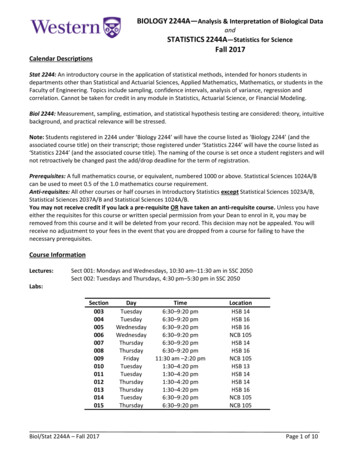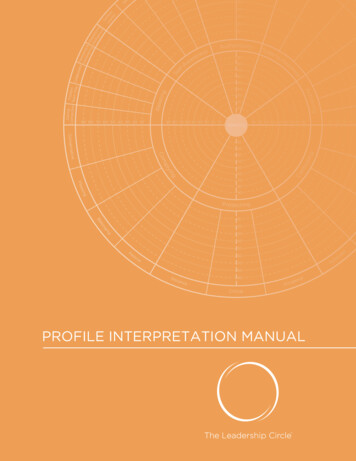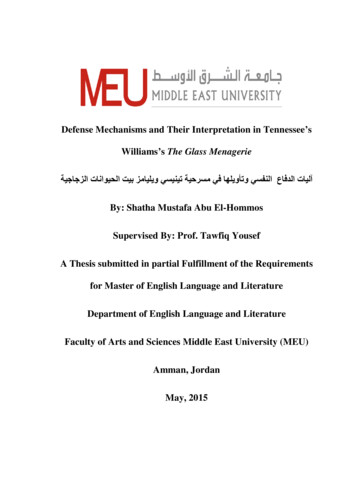
Transcription
Defense Mechanisms and Their Interpretation in Tennessee’sWilliams’s The Glass Menagerie ت ا ع ا و و و ا ا ت ا By: Shatha Mustafa Abu El-HommosommosSupervised By: Prof. Tawfiq YousefA Thesis submitted in partial Fulfillment of the Requirementsfor Master of English Language and LiteratureDepartment of English Language and LiteratureFaculty of Arts and Sciences Middle East University (MEU)Amman, JordanMay, 2015
ii
iii
ivAcknowledgementsI wish to thank my supervisor Dr.Tawfiq Yousef for his constantsupport and valuable advices. I am also grateful to my family my unclesDr. AbdelsalamHammash, ZakaryaHammash, and my brother Darweesh.Iam also going to thank my friends Ayat Ali, Haya abusaleek,HaneenAlsarisi, and Raja’aEmad for their moral support. I would like toexpress my thanks to my aunt Jessica Bader, and my neighbor KhawlaAlsarfandi for her moral support. I am also gratitude to my students for theirmoral support. Thanks are also extended to the faculty members of thedepartment of English at Middle East University.
vDedicationI would like to dedicate this thesis to my Mother, Dr.HananHammash, my grandfather,Ahmed Hammash, My grandmother,KhadijehAlkhandaq, my brother, and my uncle Dr. AbdelsalamHammash.
viTable of contentsSubjectPageAuthorizationIIThesis committee decisionIIIAcknowledgementIvDedicationVAbstract (in English)Vi-ViiAbstract (in Arabic)ViiiChapter One: 1.1 Introduction1-21.2 Questions of the study31.3Objectives of the study41.4 Significance of the study41.5 Problem of the study51.6Limitations of the study6
vii61.7Definition of termsChapter Two: Review of related literature:92.1 Theoretical studies92.2Empirical studies163-Chapter Three: Methodology214-Chapter Four:25DiscussionChapter Five: Recommendation and conclusion60References:64
viiiDefense Mechanisms and Their Interpretation in Tennessee’sWilliams’s The Glass MenagerieBy: Shatha Abu El-hommosSupervised By: Prof. TawfiqYousefAbstractThe current study applies Freud’s defense mechanisms to TennesseeWilliams’s play The Glass Menagerie. Although the play has beendiscussed by many studies, this study is different in that it concentrates on asubject that has not received due attention in previous studies. This themeis concerned with the use of Freud’s defense mechanism in The GlassMenagerie.A more in-depth study of this theme would hopefully provide amore comprehensible understanding of the play.The thesis examines the psychological factors that determine thebehaviors of the characters in The Glass Menagerie. It focuses on theanalysis of the types of personalities (id, ego, and superego), the types ofminds (preconscious, conscious, and unconscious) in general and ondefense mechanisms in particular.The study attempts interpretations of the characters’ behaviors in lightofFreud’s defense mechanisms. It shows that all of the characters make useof different sorts of defense mechanisms. Furthermore, the thesis clarifies
ixthe relationship between the play and its author’s life. It asserts that theplay The Glass Menagerie is an autobiographical play. It reflects the life ofits author. The thesis psychoanalyzes the character’s behaviors, and theauthor’s life.Key words: Defense Mechanisms and Their Interpretation , Tennessee’sWilliams’s The Glass Menagerie
x ت ا ع (' ا ) و و و ا ا ت ا إ( اد -. : ا / 01 أ ا 23 إ . اف ا آ 7 ر 9: ; : 2 ا را : % م ه"! ا را ت ا ع ا و و ا ) ا( ت ا ' ' ، و . 45 أن ا . /0 1/23 ا را ت ، إ , أن ه"! ا را رآ ت 0 ى 789 ا ; . ه"! ا ا ; ود( @ 0 ? 4 % م ا را ) . D% ا / ا ا ا ) د 0 آ ت ا B C ت ا ) ا( ت ا ' ' F آ 0 E0 آ ت ا B C ت 3 HC ص و 0) E0 أ( ط ا B C ت ) ا @ ، وا ، (, وا (, ا L ،( 0/ إ E أ( اع ا %/ ل ) NO ا ، وا ، وا 8 و ( HC م . ) ول ا را أن R/ ات 0 آ ت ا Q اد ء ت ا ع ا ا و ، و @S ا را أن ' ; ا B C ت ا % م ام أ( اع . 0 ت ا ع ا . و % م ا را V ا . O8/ ا و ة آ ، @N آ أ(@ T آ % % أن ه"! ا ه ة ذا ؛ F أن ا WH/ ة L ، @ T إ E أ(@ % م 0 / ) ( 0 0 آ ت ا B C ت و ة ا .Z T ا 3 ت ا : 7 3 ت ا ع . ا W و [و ، @0 و 1 0 ا ) ا( ت ا ' '
1Chapter one1.1 IntroductionWhat we write is a reflection of our psyches. It is also a reflectionfor us. People can see us through our writings. What we write is actuallyour mirror. It represents us, our thoughts, the way in which we think, andour feelings. In this chapter we are going to explain the aim of this thesis.that we are going to interpret the character's behaviors in the light ofpsychology and in specific defense mechanisms. Also, we are going toclarify the relationship between the author's life and the play. Themethodology which we are going to follow in writing the thesis, and thesignificance of the study will be shown.Biographical Background:The Playwright Tennessee Williams was born Thomas LanierWilliams on March 26, 1911, in Columbus. He is widely considered thegreatest Southern playwright and one of the most important playwrightsin the history of American drama. He gave American theatergoersunforgettable characters, an unbelievable vision of life in the South, and aseries of powerful portraits of the human condition. He was deeplyinterested in something he called "poetic realism," namely the use ofeveryday objects which, seen repeatedly and in the right contexts, becomefilled with symbolic meaning. He wrote the play The Glass Menagerie
2which was a reflection of Williams’s own life. He reflected his life andhis own suffering to people throughout his writings. Williams’sgrandfather wasted the family’s fortune. Tennessee Willams's father wasa heavy drinker and a travelling salesman. His mother became the modelfor the foolish but strong Amanda Wingfield in The Glass Menagerie,while his father represented the aggressive, driving Big Daddy in Cat ona Hot Tin Roof. Williams’s mother suffered from a hysterical attack, andeven his sister Rose ( a model for Laura in The Glass Menagerie )suffered from mental illness , and eventually underwent a prefrontallobotomy. In other words, the circumstances which were surroundingWilliams’s life are almost the same circumstances that he portrayed in hisplay The Glass Menagerie.Psychoanalytical Background:The Glass menagerie is a memory play. Bradford W defined thememory plays as the plays that focuses on the past as narrated by themain character. Usually, the play is a dramatic representation of theplaywright's life, or at least loosely based upon the playwright'sexperiences(p.1). Being narrated by someone( a human), this means thepossibility of omission and exaggeration of events because humansforget, and sometimes change the facts. The play's actions are drawn fromthe memories of the narrator Tom Wingfield (a character in the play). The
3play evolved from a short story entitled “Portrait of a Girl in Glass "byTennessee Williams, which focused more on Laura than the play does.The play had undergone many studies by different critics and researchers.The basic theme which researchers were concerned with in the analysis ofThe Glass Menagerie was psychology. For example, Mahfouz (2001)states that The Glass Menagerie reveals itself to be a psychologicaldrama. Psychology is an academic and empirical discipline that involvesthe scientific study of mental functions and behaviors. Psychology is ascience which illuminates our understanding of life and many thingsincluding literature. Psychoanalysis is a science which is derived frompsychology. Sometimes works which are difficult and apparentlyconfused can be seen more clearly in the light of the psychologist'sdemonstration of what is actually going on among characters.In this research, the researcher is going to analyze the characters andthe events from a psychoanalytical point of view, and is going to focus onthe defense mechanisms and how they are employed in the play.1.2Questions of the studyThe current study will answer the following questions:1. What are the psychological factors that determine the behavior of thecharacters in The glass menagerie?
42. How do Freud's defense mechanisms help explain the characters’actions in the play?3. How does the play The Glass Menagerie reflect its own author’s life?1.3 Objectives of the study:The current study aims to achieve the following objectives:1. To give a psychoanalytical interpretation of the behavior of thecharacters.2. To show the role of the defense mechanisms in the play.3. To explain that the play is primarily reflection of its author's life.1.4 Significance of the study:The significance of this study is that it concentrates on ly“DefenceMechanisms”. The characters of the play make use of defensemechanisms in an attempt to put an end for their misery, but we will seeduring the analysis of the play that none of the defense mechanismsworks as a final solution for this misery. Although the play has beenviewed from a psychoanalytical perspective by several researchers likeMahmood T , defense mechanisms in the play have not been fullycovered.
51.5 The statement of the problem:The major problem the present study deals with the way the playwrightTennessee Williams utilizes a basic concept in Freudian psychology,namely “defense mechanisms” to present his characters on apsychological basis that looks scientific, convincing and appealing. Thisanalytical strategy adds to the other studies which have been applied toWilliams play The Glass Menagerie on a thorough and comprehensivebasis that can account for the behaviors of his characters throughout theplay. Besides, the research attempts to show the connection between theplay’s characters and events and the life of the author and his ownfamily’s social and psychological background.According to Freud, defense mechanisms are the processes by whichour feelings in the unconscious are kept repressed or hidden so that wecan avoid knowing what we don’t want to know. Defenses include thefollowing types (Tyson,18):a. selective perception: hearing and seeing only what we believe we canhandle.b. selective memory: modifying our memories or forgetting them entirely.c. denial: believing that a problem or an unpleasant incident did nothappen.d. avoidance: staying away from any situation that is liable to stir ourrepressed unconscious feelings.
6e. displacement; blaming something on someone or something that is lessthreatening than the source that actually caused it.f. projection: ascribing our problem or fear to someone else in an attemptto deny that we did it ourselves.g. regression: return to either to a pleasant or unpleasant past experiencewhich is not just imagined but relived.1.6 Limitations of the study:The research is based primarily on only one of the plays of theplaywright. The results, therefore, cannot be generalized or applied to hisother plays.1.7 Definition of terms:Psychoanalysis: it is a method of treating mental illnesses, and a theorywhich explains human behavior.The conscious: includes everything that we are aware of. This is theaspect of our mental processing that we can think and talk aboutrationally. A part of this includes our memory, which is not always partof consciousness but can be retrieved easily at any time and brought intoour awareness (Joseph, 1992).The unconscious: It is the mind which works as the storehouse of thememories, and the potential experiences. It does not follow any logical
7rules or laws because it is not controlled by the rational part of thememory, the conscious (Joseph, 1992).ThePreconscious: is the part of the mind that represents ordinarymemory. While we are not consciously aware of this information at anygiven time, we can retrieve it and pull it into consciousness when needed(Joseph, 1992).Defense Mechanisms: Are ways that are used to keep the mind frombeing destroyed by worries and anxieties or to get rid of our frustration orfailure ( Al Khatib, 2011).Id: The type of self which does not think of anything else other thanfulfilling its desires and needs (Al Khatib, 2011).Ego: is one of the types of self and it is a balanced-state between id andthe superego and its relationship to both of them. It is the conscious selfthat looks at the external world through the senses and plays as a refereebetween the id and the superego. It is able to postpone its needs to avoidunpleasant consequences (Al Khatib, 2011).The super ego: is the type of self which pays high attention to moralstandards and rules through the contact with parents and society. It is thetype of self which tries to achieve desires and wishes but withoutviolating any law or code of ethics or morals (Al Khatib, 2011).Declarative memory: is the system that provides the basis for consciousrecollection of facts and events, but this system is not just a
8warehouse of information, of veridical memories of actual happeningsthat can be retrieved at will ( Jacobs, 2009).
9Chapter 2Review of related literature2.1 Theoretical studies:The dominant atmosphere of the post-modern American play TheGlass Menagerie by Tennessee William is psychology. What motivatethe characters in the play to behave in a certain way are their psyches.So, psychoanalysis is the guide which will help us to understand thecharacters and their reactions towards what is happening around them. Itis the key which can enable readers and viewers to unlock theunconscious side of the characters.There are many studies which investigated psychology andpsychoanalysis in human life in gene
Williams play The Glass Menagerie on a thorough and comprehensive basis that can account for the behaviors of his characters throughout the play. Besides, the research attempts to show the connection between the play’s characters and events and the life of the author and his own family’s social and psychological background. According to Freud, defense mechanisms are the processes by which .

